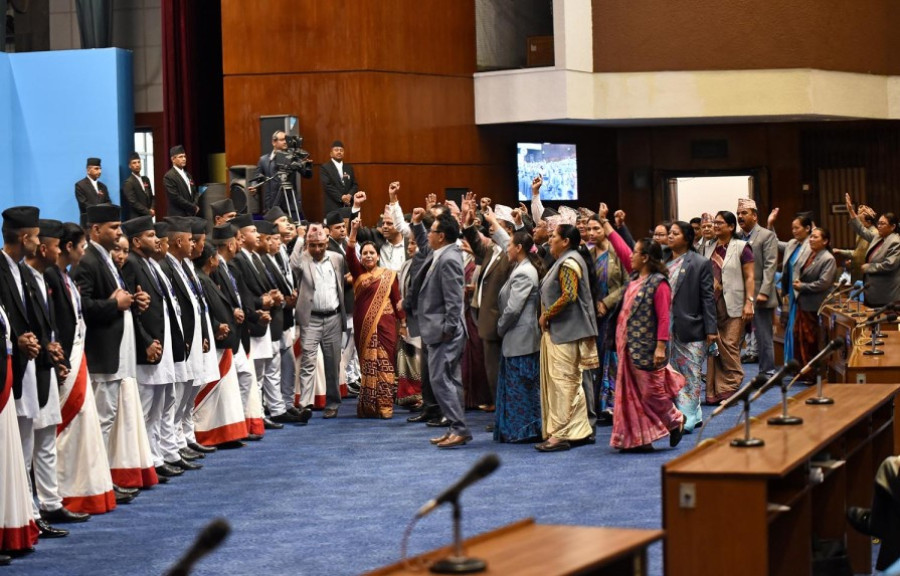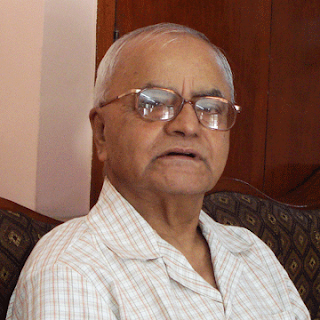Columns
Opposition’s absurdity
If the government is hamstrung on one pretext or another, people’s faith in the system starts eroding.
Lok Raj Baral
Government and opposition are inseparable organs of a democratic system. In totalitarian regimes, the opposition almost gets eliminated and banished, while authoritarian regimes allow political dissent to a limited extent—political scientists call it ‘‘limited pluralism’’. Under such regimes, critics must abide by the limitations imposed by the authorities. Following the 1960 coup, the royal regime in Nepal allowed political dissent without undermining the “supreme and dynamic leadership of the king”.
However, I am referring to the context of parliamentary opposition that is formally recognised with all emoluments. The Communist Party of Nepal (UML), as the second largest party, is now officially accepted as an opposition party in the House of Representatives.
The party has not had as much of a chequered history as other left parties. First, it established a distinct identity by imitating the “liquidation of class enemies” adopted by the Indian Naxalites in a few small villages in the Naxalbari area of West Bengal’s Darjeeling district. The Naxalties pursued a violent method, and they selected individuals who, in their minds, were feudal exploiters of poor peasants. Known as the ‘‘Jhapali’’ group, its members killed some notable individuals after giving them bad names, causing havoc for some time. Later, this group changed its line, first by participating in the movement to restore the multiparty system in 1990, and then by joining the interim government headed by Nepali Congress leader Krishna Prasad Bhattarai. Its formal transformation was complete after accepting Madan Bhandari’s new refrain—Janatako Bahudaliya Janabad (people’s multiparty democracy). Thus, the Maoist-Leninist party changed its chrysalis after becoming the second-largest party in Parliament in the 1991 multi-party elections.
The UML was aggressive in its words and actions as an opposition party. Since its political background was against the multiparty parliamentary process, it was not surprising to see it go berserk in the name of opposition to the newly elected Girija Prasad Koirala government. Besides supporting the movement launched by civil servants, it also demonstrated its lousy image when it adopted the sadandekhi sadaksamma (from Parliament to the street) policy. But with time and experience in both government and opposition, the UML transformation was evident as it moderated its role.
Yet, the party leaders’ strategies continue to oscillate between extremism and reasonableness by playing an oppositional role in Parliament. There have been disruptions in parliament whenever UML disagreed with the agenda set by the government. When it was in power, similar agendas were rationalised, taking precipitate decisions; while in opposition, its role became obstructionist. Parliament has not been allowed to function today owing to the UML’s demand that a high power probe committee be established to find the actual culprits involved in the latest 100 kg gold smuggling. The UML believes that the higher authorities might have connived for it, hence the need for a new committee.
In past instances, the KP Sharma Oli-led UML government failed to identify the smugglers, despite forming an investigation committee to trace the gold smugglers and those allegedly involved in other scandals. Reports submitted by various committees were/are kept confidential to protect individual identities. In several cases and disagreements on multiple issues, such as the speaker’s alleged role in contriving the split of the UML by protecting the members of the breakaway party from being disqualified, and so on, Parliament had been taken hostage by the UML. The records of other parties in Parliament are not up to the mark, though in numerical terms, their interventions and obstructions are relatively low. Thus, by holding parliament hostage on a small pretext, all the essential bills are stuck, along with the disenchantment and anger of the general people.
The incumbent government is being criticised for giving the impression that it is trying to protect its senior leaders and some other offenders involved in the gold smuggling, the Lalita Niwas land acquisition case and fake Bhutanese refugee scam. Some leading newspapers have divulged the names of people connected with similar incidents in the past, provoking the leader of the opposition and even some members of the Congress (ruling partner) to form a probe committee to inspect various scandals. Oli has gone so far as to demand the resignation of the home and finance ministers for their failures.
The Maoist-led government, however, insists on the opposition’s patience until the submission of the Central Investigative Bureau’s (CIB) report. But, intent on embarrassing and, if possible, proving the utter failure of the Pushpa Kamal Dahal’s government, the UML is not satisfied with any promise short of forming a probe committee, suspecting that such incidents would not be possible without the connivance of top ruling parties’ leaders, especially the home and finance ministers. Oli was annoyed with Home Minister Narayan Kaji Shrestha, who, on being asked by some media persons, had stated that in no circumstances would he work under any instruction from Baluwatar or Balkot to protect the offenders, indicating Dahal and Oli.
The UML has declared that they would disagree on any other assurances but the probe committee and would continue parliamentary obstruction without weighing its pros and cons for the party. Such frequent disruptions of Parliament give the impression that political parties in Nepal are not up to the standards of parliamentary practices. If the government is permanently hamstrung on one pretext or another, people’s faith in the system starts eroding.
Meanwhile, it is interesting to observe that the other two parties—the Rastriya Swatantra Party (RSP) and the Rastriya Prajatantra Party (RPP)—that have sizable strengths in the Parliament oppose such prolonged obstruction of the house and urge the parties concerned to be reasonable as well as responsible so that they could ventilate issues demanding immediate attention. The RSP went to the extent of holding a meeting outside the gate of Parliament, showing its resentment at the perennial obstruction of the house. Many times before, the UML’s brinkmanship had not helped the party, forcing it to rescind its decision. In the present context, too, the party is increasingly being isolated from most parties in the Parliament. The general public is disgusted with the second largest party, expected to show patience and empathy until the findings of the CIB.




 8.26°C Kathmandu
8.26°C Kathmandu















